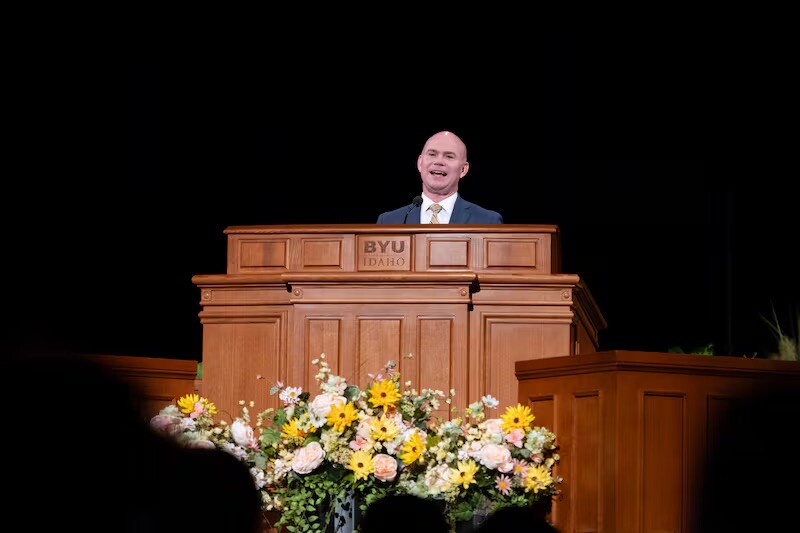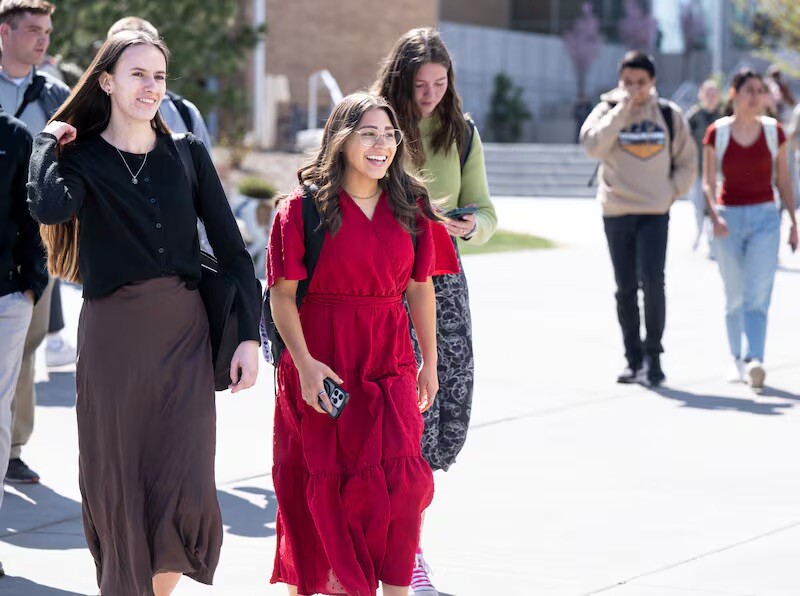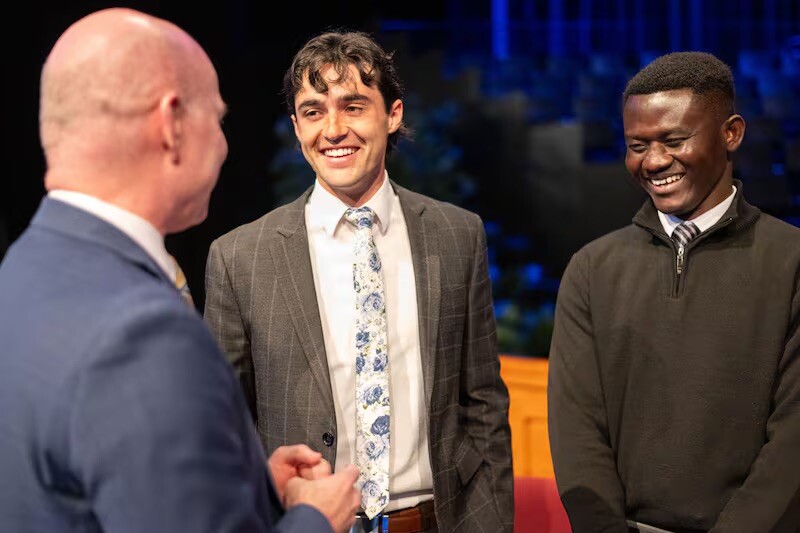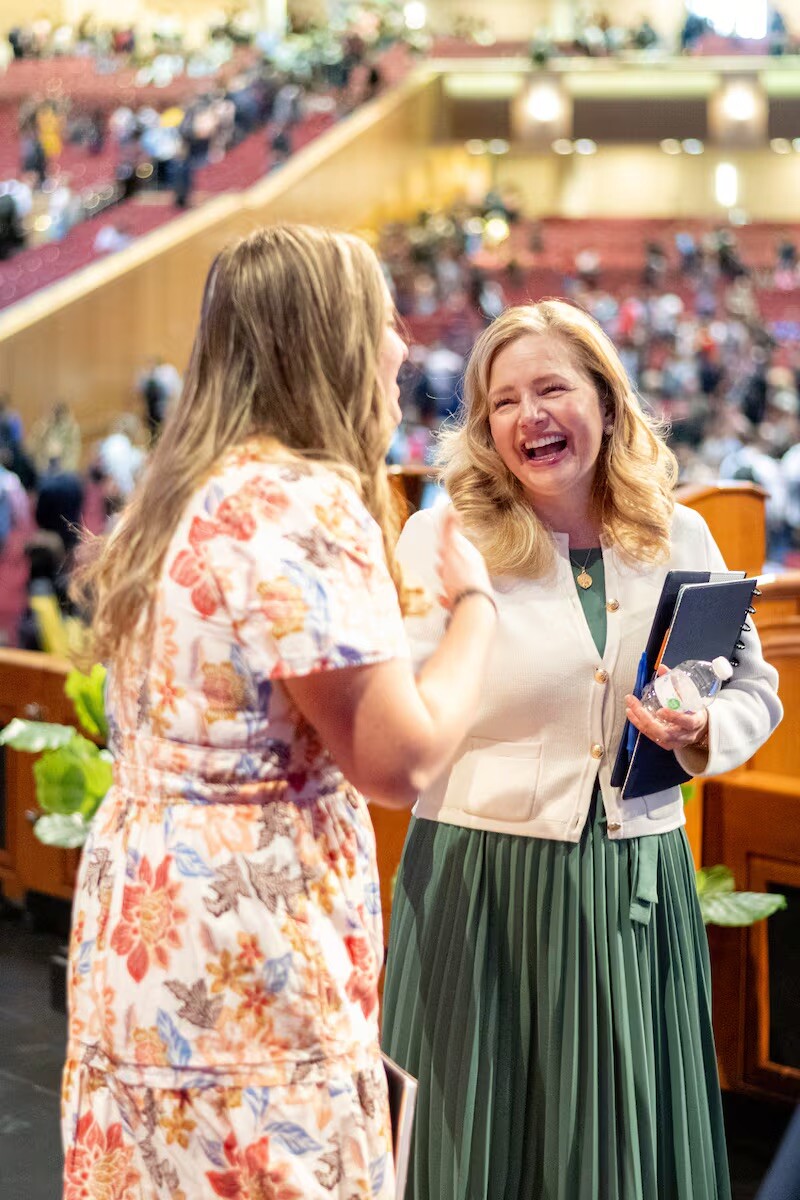This article was first published by Church News. It is published here with their permission.
When BYU–Idaho President Alvin F. Meredith III’s son Chase was about 5 years old, President Meredith bought him a kite.
One breezy afternoon, as the two were flying the kite for the first time, Chase asked again and again for the kite to go higher. When President Meredith told Chase there was no more string and it couldn’t go any higher, the young boy suggested they cut the string. Despite President Meredith’s protestations, Chase insisted, and President Meredith gave in. When the kite inevitably crashed down to the pavement, Chase burst into tears.
“In his young mind, Chase saw the string as a constraint, something keeping the kite from flying higher,” President Meredith explained during a campus devotional on Tuesday, April 22.
In actuality, the string was not holding the kite down. It was holding it up, he said.
While offering the opening devotional for the spring semester, President Meredith bore witness of the blessings of obedience.
“Obedience is not about earning God’s love — it’s about responding to it,” he testified. “Jesus lived in perfect obedience and showed us the path to follow.”
Drawing upon the teachings of President Dallin H. Oaks, first counselor in the First Presidency, President Meredith also encouraged students to strengthen their commitment to being fully obedient, including to the school’s Honor Code.

Christ, obedience and the plan
In His earthly ministry, Jesus consistently demonstrated obedience to His Father in actions and words. “I came down from heaven, not to do mine own will, but the will of him that sent me” (John 6:38).
The late Elder Robert D. Hales of the Quorum of the Twelve Apostles said, “Of all the lessons we learn from the life of the Savior, none is more clear and powerful than the lesson of obedience.”
President Meredith noted that the Father’s plan of happiness and the principle of obedience are intertwined so tightly that to truly grasp one, individual’s must understand the other.
Alma testified to Zeezrom about Adam and Eve and the plan of happiness, “Therefore God gave unto them commandments, after having made known unto them the plan of redemption, that they should not do evil” (Alma 12:32).
Said President Meredith, “The great test in the great plan is to learn to be obedient.”
Obedience brings joy
President Oaks used the image of a kite string during his October 2024 general conference address “Following Christ.” The kite string, President Oaks explained, represents the covenants that connect individuals to Heavenly Father and Jesus Christ.
President Oaks taught, “As we honor those covenants by keeping Their commandments and following Their plan of redemption, Their promised blessings enable us to soar to celestial heights.”
In spiritually immature moments, individuals may see commandments and covenants the same way that his son saw the kite string, said President Meredith. “I plead with you to not fall into that trap.”
He invited students to open their spiritual eyes to recognize that obedience unlocks divine power in their lives, enabling them to rise higher than they ever could on their own.

The Honor Code and obedience
In that same conference address, President Oaks distinguished commandments into two types: permanent and temporary. Temporary commandments are those that are meant to be followed for only a specified period of time.
BYU–Idaho’s Honor Code has both, President Meredith noted. “Being honest, living a chaste and virtuous life and living the word of wisdom are permanent commandments in our Honor Code that align with celestial standards. But a few elements of our Honor Code, especially the dress and grooming expectations, are temporary and not tied to temple worthiness.”
While at BYU–Idaho, students and employees have all agreed to “maintain an elevated standard distinctive to educational institutions of The Church of Jesus Christ of Latter-day Saints” (CES Dress and Grooming Principles).
In the spirit of obedience and “with all the love and compassion that I can offer,” President Meredith invited listeners to “renew our commitment to being fully obedient to the Honor Code, including the temporary aspects found in the dress and grooming expectations. In this ‘special and sacred and set apart place,’ I hope that you will feel of both our high love and our high expectations.”

4 key truths
In conclusion, President Meredith highlighted four truths about obedience.
First, there’s a distinction between deliberate disobedience and human weakness. “When the Lord speaks of weakness, it is always with compassion and mercy. However, conscious rebellion is regarded with greater seriousness,” said President Meredith.
Second, an individual’s worth is not tied to their obedience.
For the third truth, he quoted Brother Brad R. Wilcox, first counselor in the Young Men general presidency, who taught: “Worthiness is not flawlessness.”
Worthiness means individuals strive to be obedient and repent when they fall short, President Meredith explained.
Fourth, “while there are many reasons to obey the commandments, the most powerful and pure motivation is love for the Savior.”
Like a kite that needs the string to soar, “we need the steady connection of commandments and covenants to reach our divine destination,” President Meredith taught.
In her remarks, Sister Jennifer Meredith spoke of Heavenly Father’s great plan of happiness, also known as the plan of salvation or the plan of redemption.
She testified that Jesus Christ is central to that plan. “We have just celebrated Easter and prior to that enjoyed general conference. What have you felt prompted to do to make Jesus Christ more central in your life? Our Father made Jesus Christ central to His plan. How will we make Him central to ours?”

